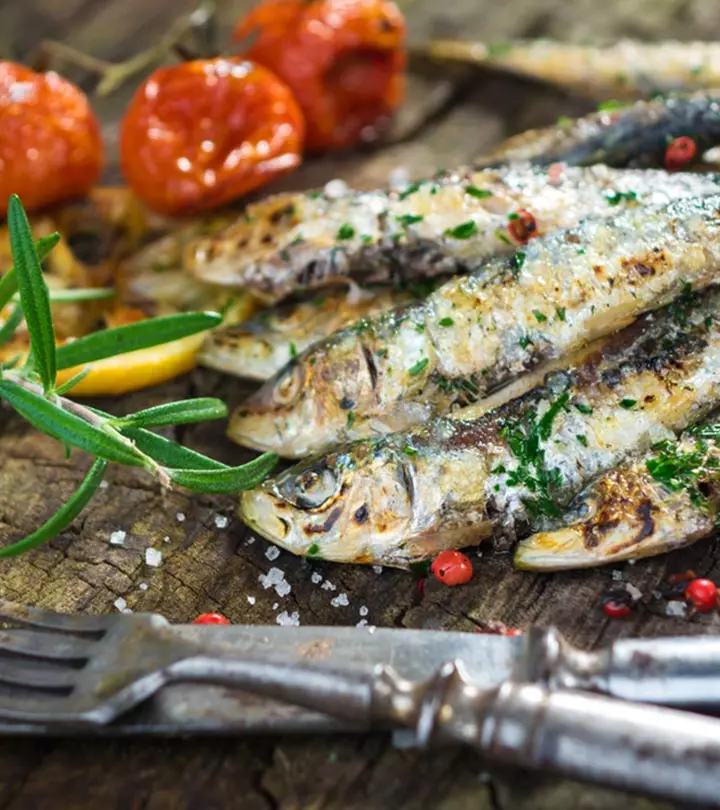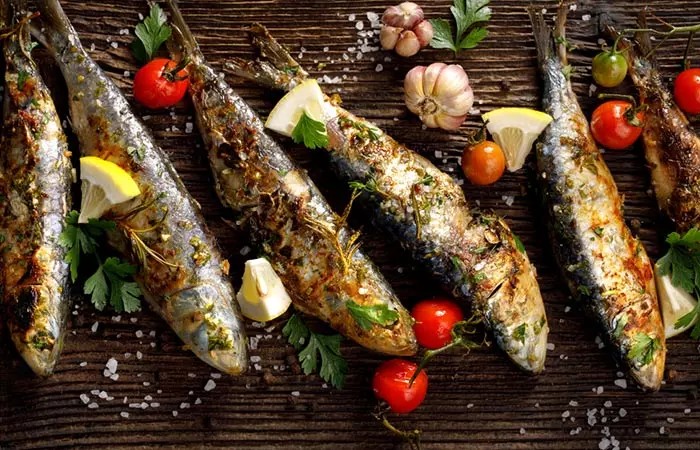5 Benefits Of Sardine, Nutrition, Recipes, & Side Effects
Small packets of healthy, salty deliciousness that can boost your health in many ways.

Image: Shutterstock
The health benefits of sardines are gaining the attention of many health enthusiasts, and these benefits can be attributed to their highly nutritious nature. Sardines are tiny-boned fish and are relatively inexpensive. They are mostly available in cans as they can get spoiled easily. Sardines can be enjoyed directly from the can, or you may add them to your regular salads, pizza, tacos, and sandwiches. Read this article to know more about sardines, the health benefits they offer, easy recipes with them, and possible side effects. Scroll down.
In This Article
What Are Sardines?
Coming from the Clupeidae family, they are small, silver-colored fish that have been around for thousands of years. Said to have been discovered by the Romans near the coast, today they play an essential part in both human and animal kingdoms. While they are food for larger mammals like sharks and birds, for humans, they are used as bait, and as a source of nutrition. Not consumed very often in the US, sardines are frequently eaten by people in the United Kingdom, Spain, and Portugal, and Middle Eastern countries. Earlier sardines were consumed fresh. But these being highly perishable, many prefer to buy them as canned sardines.
 Trivia
TriviaNow, let us look at the nutrition that sardines provide.
Key Takeaways
- Sardines are rich in minerals like calcium and phosphorus and vitamins D and A.
- Studies suggest that eating fatty fish like sardines helps reduce the risk of dementia, Alzheimer’s, and diabetes.
- Their vitamin D and calcium content helps strengthen bones and reduce the risk of bone disorders.
- However, they are highly perishable, so avoid consuming them raw.
Nutritional Information
According to the USDA, 2 sardines give you 209 calories along with a host of nutrients, ranging from vitamin A and vitamin D to a source of calcium and phosphorus. What’s better, sardines have no carbohydrates or sugar, making them very healthy. Find below the nutritional value of sardines as given by USDA (1).
| Nutrient | Amount |
|---|---|
| Calcium | 91.7mg |
| Phosphorus | 118mg |
| Potassium | 95.3mg |
| Sodium | 73.7mg |
| Vitamin D | 46.3 IU |
| Vitamin A | 25.3 IU |
Sardines’ nutritional value is very high and can be beneficial to your health in many ways. Let’s read next about the different health benefits of sardines.
Potential Health Benefits Of Sardines
Sardines are considered a great addition to our diets because they offer a multitude of benefits. Due to their large reserve of nutrients such as vitamins and essential minerals, they are considered healthy (2). It is also a high-protein food that is likely to keep you satiated for a long time. Let’s check out all the benefits in detail below.
- May Help Reduce The Symptoms of Alzheimer’s
Did your mother ever tell you that eating fish is good for your brain? She was probably right. Sardines fall under the category of fatty fish due to its high level of omega-3 fatty acids. A study was conducted to see the effect of fatty fish such as sardines in diseases like dementia, Alzheimer’s disease, and vascular disease.
According to the 2022 Alzheimer’s Disease Facts and Figures published in Alzheimer’s & Dementia: the Journal of the Alzheimer’s Association, approximately 6.5 million Americans aged 65 and older live with Alzheimer’s dementia. In 2019, 121,499 deaths from Alzheimer’s were recorded in the United States, making it the sixth-leading cause of death. There was an increase of over 145% in reported deaths from Alzheimer’s between 2000 and 2019, contrasting declines in deaths from stroke, heart disease, and HIV during the same period.
The researchers found that in comparison to lean fish, consumption of fatty fish twice a week showed a decrease in the risk of developing dementia by 28% and Alzheimer’s by 41%. While this study suggests that fatty fish may be good for brain health, more studies need to be conducted to understand the connection between sardines and brain health (3).
- May Play A Role In Preventing Cardiovascular Diseases
Eating a healthy diet rich in fish may prevent the development of cardiovascular disease (4). Experts conducted a study to see the effect of eating a sardine-rich diet on inflammation, metabolic control, and gut bacteria. 35 patients diagnosed with diabetes were asked to follow a standard diabetes diet, or a diet rich with 100g of sardines for 5 days for 6 months. The results saw a decrease in plasma insulin levels and an increase in gut bacteria. Researchers suggest that having a sardine-enriched diet may be essential in reducing the risk of heart diseases, although more research needs to be conducted on this topic (5).
- May Play A Protective Role Against Diabetes
In a study that was conducted, 152 people with prediabetes and old age were asked to consume sardine two times per week for 1 year. The results showed that those in the sardine group had a decreased risk of developing diabetes. Along with this, the patients showed a decrease in triglyceride as well as an increase in HDL cholesterol (good cholesterol), omega3, and bile acid levels. This study indicates that sardines may play a protective role against diabetes and anyone at a high risk of developing diabetes (7).
- May Aid In The Development Of Healthy Bones
The calcium in sardines is reported to be 91.7 mg, according to USDA (1). Calcium and vitamin D are necessary for the development of healthy bones and play an important role in preventing bone disorders such as osteoporosis, and rickets (7), (8). Sardines are high in calcium, so you can add these silver swimmers to your diet for healthy bones (9). A Vitamin D-rich food like sardine can also lowers cholesterol levels and reduces the chances of muscle inflammation.
- May Protect Your Skin From UV-rays Of The Sun
If you like getting tanned but still need to protect your skin from those UV rays, then sardines may help you in that. An in-vitro study was conducted to see the anti-inflammatory activity and skin absorption of essential fatty acids from fish oil extracts. The researchers obtained oils from three fish oils, namely, sardine, mackerel, and horse mackerel. The results showed that sardine fish oil extract had a higher concentration of omega-3 fatty acids and anti-inflammatory activity compared to the other two (10). While the study suggests that sardines may play a role in protecting our skin UV rays, more studies need to be conducted to substantiate this fact.
Conner Phillips, a YouTuber, shared how eating sardines continuously for over 60 days improved his health. He found that he felt more satiated and the nutrients in the fish helped him last an entire day. He said, “Sardines are amazing for if you’re gonna go out to eat. Eating one of these (sardines) first off I found, first, I make better decisions; second, I’ve found that I feel better when we’re done eating (i).“
You can see from the above section that sardine benefits you in more than one way. From playing a role in the development of healthy bones to protecting your skin against UV-rays, and diabetes, sardines may prove to be a great addition to your diet. Let’s look at the different ways through which you can add sardines to your menu.
How To Add Sardines To Your Diet
Can you eat sardines raw? Can you eat canned sardines? All your questions shall be answered here. While sardines can be eaten from a can, it is best to avoid eating them raw. If you are looking to eat something light yet filling, a nice sardine salad would be the right way to go about it. If you are looking for a snack to complement your beer, then fried sardines would add a nice touch to it. But if you are looking for healthier options with very little oil, then you can either grill them in a pan or bake them in the oven with some salt and lemon.
Sardines are versatile and can be added to your diet in many ways to suit the occasion and mood. Let’s see about the possible side effects you can develop from eating sardines.
 Fun Fact
Fun FactLet’s see about the possible side effects you can develop from eating sardines.
Possible Side Effects Of Sardines
Sardines, like their marine siblings, are very good for us. But just like everything, it has its cons too. With pollution increasing every year and rivers being poisoned with toxic metals, it has become a little dangerous to consume fish. It is important to consider where your sardines come from. Choosing sustainably sourced sardines helps reduce your exposure to pollutants and toxins while also supporting ethical fishing practices. Opting for responsibly caught fish ensures that the ocean’s ecosystem is preserved and promotes long-term environmental health. A study was conducted to see the negative effects of sardines on rats (11). The rats were fed either red or white sardines for 60 days. The researchers observed an increase in their uric acid level along with the high accumulation of lead in the liver. Thus, it is highly advised that you buy fresh sardines and wash them properly before consumption. Excessive sardine consumption may have several other side effects:
- Risk Of Mercury Poisoning: Mercury is a heavy metal that may cause severe health issues. This often happens when the body absorbs too much mercury from food sources like fish.
- Risk Of Heart Disease: Sardines are usually canned in vegetable oils. These oils are rich in omega-6 fatty acids. Consuming excessive amounts of omega-6 fatty acids (through different food sources) may increase the risk of heart diseases, obesity, diabetes, and other health conditions.
- May Cause Vitamin A Excess: Vitamin A is a fat-soluble vitamin that boosts your eyesight, immune system, and reproductive organs function. However, consuming excess vitamin A may increase the risk of developing cancer.
Currently, there is little research to show the possible side effects of sardines on our health. More studies will need to be conducted to understand the link between the two. Let us have a look at some simple and delicious ways to prepare sardines.
How To Prepare Sardines Recipes
Sardines provide innumerable benefits as discussed above. With that being said, let us look at some of the best ways to eat sardines.
Grilled Sardines

Ingredients
- 1 tablespoon of garlic cloves, minced
- ¼ cup of extra virgin olive oil
- ¼ cup of fresh lemon juice
- 1 teaspoon of paprika
- ½ teaspoon of freshly ground black pepper
- 1 pound of fresh sardines, cleaned, scaled, and gutted
- 2 tablespoons of chopped fresh parsley
- lemon wedges, for serving
- kosher salt
Instructions
- Combine 2 teaspoons of lemon juice, lemon zest, garlic, oil, and chilli in a bowl.
- Season the mixture with freshly ground pepper and salt.
- Cut slits on both sides of every sardine.
- Rub the oil and lemon mixture all over the sardines, as well as into the body cavity and slits.
- Cook the sardines on medium heat in a pan for around 3 minutes on each side, until it is perfectly cooked through and the flesh flakes fall from the bone.
- Put the lemon halves next to the fish for another 3 minutes.
- Serve sardines with salad and grilled lemons.
Sardine Salad

Ingredients
- 2 tablespoons of extra-virgin olive oil
- 1 teaspoon of grated lemon zest
- juice of 1 lemon
- 1 teaspoon of Dijon mustard
- 1 tablespoon of rinsed capers
- 2 tablespoons of chopped fresh parsley
- 1 tablespoon of chopped fresh tarragon
- 2 stalks celery, finely diced
- 2 cans of sardines
- salt and freshly ground black pepper
- lettuce, for serving
Instructions
- Take a bowl and mix lemon zest, lemon juice, oil, capers, parsley, celery, and tarragon.
- Gently put the sardines in.
- Season with pepper and salt.
- Put the sardines on the lettuce and munch away.
The benefits of sardines can be attributed to their wonderful nutrients. When included as a part of your diet, sardines can reduce the symptoms of Alzheimer’s disease. It also reduces the risk of cardiovascular disease and diabetes. It promotes bone health and protects the skin from UV damage. Sardines can be easily added to your diet as a snack, whether grilled or baked. Although consuming fresh sardines is generally safe, stored sardines may cause an increase in their uric acid and lead levels. Hence, try including fresh sardines in your diet to reap their benefits.
Frequently Asked Questions
Which is healthier, sardines or salmon?
While sardines are richer in calcium, phosphorus, and vitamin D, salmon is low in cholesterol and a good source of omega-3 fatty acids (1), (13).
Do sardines make you gain weight?
No. Low in calories and high in protein, sardines make for a good inclusion in your weight loss diet.
Do sardines lower blood pressure?
Research suggests that sardine protein hydrolysates can help reduce blood pressure in people with mild to moderately high blood pressure (14).
Are sardines high in iron?
A 100g serving of sardines contains about 2.92 g of iron (1).
Are sardines probiotic?
Yes, the bacteria derived from Indian oil sardines have probiotic properties and help keep your gut and digestion healthy (15).
Are sardines anti-inflammatory?
Research suggests that sardines are rich in omega-3 fatty acids, selenium, calcium, zinc, and iron. They may help reduce inflammation and oxidative stress and improve the blood flow in the body. This may potentially help manage inflammatory conditions such as rheumatoid arthritis, osteoarthritis, and heart disease (16), (17). You may consult a nutritionist and health care provider to understand the various ways in which you can incorporate this delicious fish to your diet to help reap the benefits it provides. Your doctor may suggest taking fish oil supplements if you are unable to incorporate fresh sardines into your daily diet.
What are the environmental benefits of consuming sardines?
Sardines are environmentally friendly because they are low on the food chain, so they accumulate fewer toxins and are less contaminated than larger fish. They require fewer resources to harvest, for example, they do not need livestock feed and fuel emissions from fishing vessels are much lower while harvesting them. Hence, they result in a lower carbon footprint. Lastly, they breed quickly and abundantly, recovering their populations faster and minimizing the risk of overfishing. These factors make them a sustainable fishing option.
Sardines are the most commonly consumed food and are well known for their immense health benefits. The next video provides a detailed overview of its nutrition. Check it out.
Personal Experience: Source
StyleCraze's articles are interwoven with authentic personal narratives that provide depth and resonance to our content. Below are the sources of the personal accounts referenced in this article.
(i) Why I Ate Sardines Everyday For Over 60 Dayshttps://www.youtube.com/watch?v=ki3B8T9yjUY
References
Articles on StyleCraze are backed by verified information from peer-reviewed and academic research papers, reputed organizations, research institutions, and medical associations to ensure accuracy and relevance. Read our editorial policy to learn more.
- Fish Sardine Atlantic Canned in Oil Drained Solids with Bone
https://fdc.nal.usda.gov/fdc-app.html#/food-details/175139/nutrients - Seafood Consumption and Components for Health
https://www.ncbi.nlm.nih.gov/pmc/articles/PMC4776937/ - Benefits of Fatty Fish on Dementia Risk are Stronger for Those Without APOE Epsilon 4
https://www.researchgate.net/publication/7492109_Benefits_of_fatty_fish_on_dementia_risk_are_stronger_for_those_without_APOE_epsilon_4 - Issues of Fish Consumption for Cardiovascular Disease Risk Reduction
https://www.ncbi.nlm.nih.gov/pmc/articles/PMC3705336/
- Effects of Sardine-enriched Diet on Metabolic Control Inflammation and Gut Microbiota in Drug-naïve Patients with Type 2 Diabetes: A Pilot Randomized Trial
https://www.ncbi.nlm.nih.gov/pmc/articles/PMC4836051/ - Type 2 diabetes preventive effects with a 12-months sardine-enriched diet in elderly population with prediabetes: An interventional, randomized and controlled trial
https://pubmed.ncbi.nlm.nih.gov/33932804/ - The use of calcium and vitamin D in the management of osteoporosis
https://www.ncbi.nlm.nih.gov/pmc/articles/PMC2621390/ - Rickets–vitamin D deficiency and dependency
https://www.ncbi.nlm.nih.gov/pmc/articles/PMC3313732/
- Variation in Nutrient Composition of Seafood from North West Africa: Implications for Food and Nutrition Security
https://www.ncbi.nlm.nih.gov/pmc/articles/PMC7590009/ - In vitro percutaneous absorption studies and in vivo evaluation of anti-inflammatory activity of essential fatty acids (EFA) from fish oil extracts
https://pubmed.ncbi.nlm.nih.gov/15979259/ - Negative Health Effects in Rats Fed on Sardine Fishes
https://www.researchgate.net/publication/257494083_Negative_health_effects_in_rats_fed_on_sardine_fishes - Advice about Eating Fish
https://www.fda.gov/food/consumers/advice-about-eating-fish - Fish, salmon, Atlantic, farmed, cooked, dry heat
https://fdc.nal.usda.gov/fdc-app.html#/food-details/175168/nutrients - [Antihypertensive effect and safety evaluation of vegetable drink with peptides derived from sardine protein hydrolysates on mild hypertensive, high-normal and normal blood pressure subjects]
https://pubmed.ncbi.nlm.nih.gov/12471719/ - Indian oil sardine (Sardinella longiceps) gut derived Bacillus safensis SDG14 with enhanced probiotic competence for food and feed applications – ScienceDirect
https://www.sciencedirect.com/science/article/abs/pii/S0963996921003744 - Eating more sardines instead of fish oil supplementation: Beyond omega-3 polyunsaturated fatty acids, a matrix of nutrients with cardiovascular benefits
https://www.ncbi.nlm.nih.gov/pmc/articles/PMC10153001/ - Evaluation of Sardine Fish Extract Meal on Papain Induced Osteoarthritis in Experimental Rats
https://www.researchgate.net/publication/332876329_Evaluation_of_Sardine_Fish_Extract_Meal_on_Papain_Induced_Osteoarthritis_in_Experimental_Rats
Read full bio of Reda Elmardi
Read full bio of Varsha Patnaik
Read full bio of Ravi Teja Tadimalla
Read full bio of Aparna Mallampalli



























Community Experiences
Join the conversation and become a part of our empowering community! Share your stories, experiences, and insights to connect with other beauty, lifestyle, and health enthusiasts.